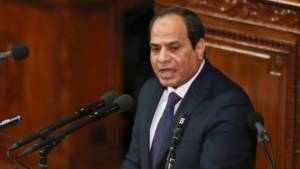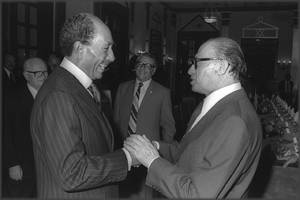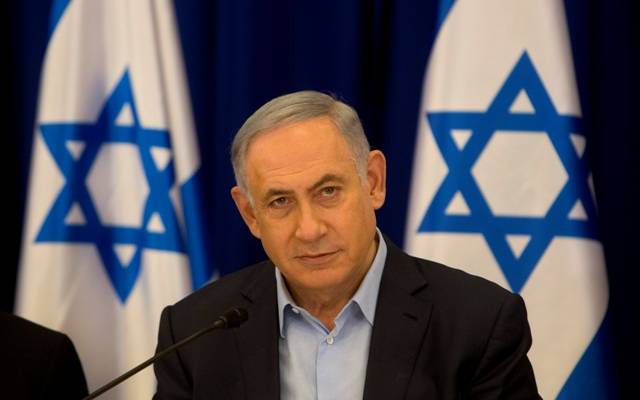
Egyptian President Abdel-Fattah el-Sissi (Koji Sasahara/AP)
Netanyahu welcomed the Egyptian president’s peace overtures and willingness to help Israel reach a settlement with the Palestinians, although he rejected the French proposal, which el-Sissi supported.
President Abdel-Fattah el-Sissi said Tuesday that Egypt’s relations with Israel, rooted in a landmark 1979 peace treaty, can only be “warmer” if his country’s former enemy reached a settlement with the Palestinians, and he pledged that Cairo would “make every effort” toward a solution.
The Egyptian leader also declared his support for a French proposal to hold a Mideast peace conference, an idea already rejected by Israel, citing it along with U.S. efforts, a 2002 Arab peace plan and the international Mideast peace quartet as possible avenues to such a settlement.
“I welcome Egyptian President El-Sisi’s remarks and his willingness to make every effort to advance a future of peace and security between us and the Palestinians and the peoples of the region,” Israeli Prime Minister Benjamin Netanyahu said. “Israel is ready to participate with Egypt and other Arab states in advancing both the diplomatic process and stability in the region. I appreciate President El-Sisi’s work and also draw encouragement from his leadership on this important issue.”
Netanyahu has rejected the French initiative, saying direct negotiations were the only way to resolve the conflict with the Palestinians. He is on record as saying the 2002 Arab Peace Initiative has some positive aspects, but could not be the basis for negotiations.
The Arab peace plan offers Israel full recognition by Arab states in exchange for Israel’s withdrawal from territory it captured in the 1967 Six Day War.
In one of his most detailed public comments on the Israeli-Palestinian conflict since taking office nearly two years ago, el-Sissi called on Israel and the Palestinians to seize what he described as a “realistic” and “great” opportunity to reach a peaceful settlement to their decades-old conflict, saying they need look no farther than the Egypt-Israel accord to see the positive outcome of peacemaking.

Then-PM Menachem Begin welcomes Egyptian President Anwar Sadat to Israel in 1979. (Ya’acov Sa’ar, GPO)
He said the “trust” that exists between Egypt and Israel nearly 40 years after their peace accord is demonstrated in Israel’s consent to the deployment of Egyptian troops backed by warplanes and armor in a section of the Sinai Peninsula that borders Israel and should be demilitarized under the provisions of their peace accord. The deployment is part of Cairo’s fight against Islamic terrorists.
Egypt and Israel fought four full-fledged wars between 1948 and 1973 before the two neighbors signed the 1979 treaty, the first between Israel and an Arab state.
Acknowledging the widely held assessment that his country’s peace with Israel has been “cool,” the Egyptian leader said: “There will be no warmer peace without a solution for our Palestinian brothers. If we do that (reach an Israeli-Palestinian settlement), we will have changed a very difficult era … I have genuine hope.”
France planned to host a ministerial meeting of 20 countries, including Egypt, Saudi Arabia and Jordan, as a first step ahead of an international conference tentatively scheduled for next month and aimed at reviving the dormant Israeli-Palestinian peace process.
Addressing Israelis and their government, el-Sissi said there was a “real opportunity” for peacemaking although some in Israel did not think peace is possible now, given the turmoil in the region. An Israeli-Palestinian deal, he added, would “give safety and stability to both sides. If this is achieved, we will enter a new phase that perhaps no one can imagine now.”
“I want to say to all those listening, Palestinians and Israelis: Please, there is now a great opportunity for a better future and life and greater hope and stability,” el-Sissi said. “Should not we seize the chance and move in that framework?”
By: AP and United with Israel Staff










